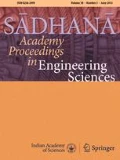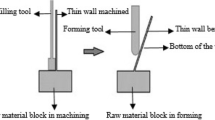Abstract
Deformation machining is a hybrid process that combines two manufacturing processes—thin structure machining and single-point incremental forming. This process enables the creation of complex structures and geometries, which would be rather difficult or sometimes impossible to manufacture. A comprehensive experimental study of forces induced in deformation machining stretching mode has been performed in the present work. A table-type force dynamometer has been used to record the deforming forces in three Cartesian directions. The influence of five process parameters—floor thickness, tool diameter, wall angle, incremental step size, and floor size on the deforming forces—is investigated. Individual as well as combined empirical models of the parameters with regard to the forces have been formed. The results of this study indicate that the average resultant force primarily depends on the floor thickness to be deformed and the incremental depth in the tool path. This could be due to the variation in local stiffness of the sheet with change in floor thickness. The effect of tool diameter, deforming wall angle, and floor size is not significant.













Similar content being viewed by others
References
Smith S, Woody B, Ziegert J and Huang Y 2007 Deformation machining—a new hybrid process. CIRP Ann. Manuf. Technol. 56(1): 281–284
Ambrogio G, De Napoli L, Filice L, Gagliardi F and Muzzupappa M 2005 Application of incremental forming process for high customized medical product manufacturing. J. Mater. Process. Technol. 162: 156–162
Agrawal A, Smith S, Woody B and Cao J 2012 Study of dimensional repeatability and fatigue life for deformation machining bending mode. Trans. ASME: J. Manuf. Sci. Eng. 134(6): 061009
Tlusty J, Smith S and Winfough W 1996 Techniques for the use of long slender end mills in high-speed milling. Ann. CIRP 45(1): 393–396
Smith S and Dvorak D 1998 Tool path strategies for high speed milling aluminum work pieces with thin webs. Mechatron. J. 8(3): 291–300
Echrif S B M and Hrairi M 2011 Research and progress in incremental sheet forming processes. Mater. Manuf. Process. 26(11): 1404–1414
Malhotra R, Reddy N V and Cao J 2010 Automatic 3D spiral tool path generation for single point incremental forming. J. Manuf. Sci. Eng. 132(6): 061003
Hussain G, Al-Ghamdi K A, Khalatbari H, Iqbal A and Hashemipour M 2014 Forming parameters and forming defects in incremental forming process: Part B. Mater. Manuf. Process. 29(4): 54–460
Duflou J R, Tunckol Y, Szekeres A and Vanherck P 2007 Experimental study on force measurements for single point incremental forming. J. Mater. Process. Technol. 189: 65–72
Aerens R, Eyckens P, Van Bael A and Duflou J R 2010 Force prediction for single point incremental forming deduced from experimental and FEM observations. Int. J. Adv. Manuf. Technol. 46: 969–982
Acknowledgements
The authors acknowledge DST Project SB/FTP/ETA-254/2012 for providing the financial support and IIT Ropar for providing the basic facilities.
Author information
Authors and Affiliations
Corresponding author
Rights and permissions
About this article
Cite this article
SINGH, A., AGRAWAL, A. Experimental force modeling for deformation machining stretching mode for aluminum alloys. Sādhanā 42, 271–280 (2017). https://doi.org/10.1007/s12046-017-0592-1
Received:
Revised:
Accepted:
Published:
Issue Date:
DOI: https://doi.org/10.1007/s12046-017-0592-1



